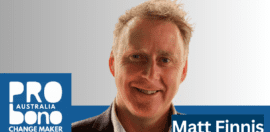Australia’s Asylum Seeker Policies Cost Taxpayers $9.6B Over Three Years
13 September 2016 at 10:43 am
Australia’s immigration policies are “expensive, inhumane and blunt”, according to a new report that has revealed the current asylum seeker framework has cost Australian taxpayers $9.6 billion since 2013.

Photo: kafeinkolik / Shutterstock.com
The report by Save the Children and UNICEF Australia, At What Cost?, lays out the full human, economic and strategic cost of Australia’s deterrent immigration policies, and provides a plan for how the Turnbull government could embrace a more humane and effective alternative.
It claims Australia’s current framework, which includes mandatory detention and offshore processing, will cost a further $5.7 billion over the next four years and will cause children to suffer ongoing mental health problems, abuse and neglect if it is not addressed.
UNICEF Australia director of policy and advocacy Nicole Breeze told Pro Bono Australia News the report showed the current system was unsustainable.
“It is extremely expensive, it is causing grave harm for people, and for our organisation the harm it is causing children and families is of particular concern, it is complicated, it is opaque and it is very difficult to assess its efficacy, its cost or its value for money,” Breeze said.
“We are in the midst of a crisis of an unprecedented proportion.
“So we’ve got 65 million people who have been forcibly displaced, 21 million refugees, more than half of whom are children, and 3.8 million displaced people in our very own region, so the scale of this crisis is enormous. That didn’t surprise us. But what did surprise us was learning that in 2015, only 107,100 refugees were able to access resettlement places globally.
“The second thing that surprised us was the volume of the cost associated with Australia’s policies, so the headline data… is that the total cost between 2013 and 2016, so that’s over a three year period, has been at least $9.6 billion.
“To give you some context on that figure, we had a look at some of the World Bank figures in 2015 looking at GDP and last year 51 countries… had GDP of less than $10 billion. So that include Niger, which had GDP of $9.7 billion, Malawi $8.9 billion and Fiji $6 billion, so we were in fact staggered by the cost of operating Australia’s deterrent policies.”
Breeze said there were four key elements to those costs; offshore processing in Nauru and Manus Island which cost at least $3.6 billion, onshore mandatory immigration detention, which cost $5.6 billion, naval interceptions or boat turn backs which ran to $295 million and then other programs, which included a deal between the Australian Government and the Cambodian Government to resettle a small number of refugees, and other efforts to find third party resettlement, which cost $112 million.
Beyond the billions of dollars needed to maintain the system, the report also found children transferred to Nauru will suffer ongoing mental health problems, abuse and neglect if there is no reform of Australia’s current approach.
In addition, it claimed thousands of asylum seeker children “living precarious lives across Southeast Asia”, will continue to face danger and harm. Alongside this, Australia’s global reputation and foreign policy interests will continue to deteriorate.
Save the Children Australia chief executive Paul Ronalds said the findings confirmed that Australia’s current framework was neither a humane nor economically sustainable model for how the rest of the world should respond to the current global refugee and migration crisis.
“Australia’s immigration policies are expensive, inhumane and blunt,” Ronalds said.
“They have caused significant harm to some of the most vulnerable children and adults on the planet, and have eroded the hope, dignity and safety of people fleeing persecution and war in places like Iraq and Syria.
“The Turnbull government has endlessly trumpeted its immigration policies, but at the same
time sought to hide their true costs through secrecy laws which criminalise whistleblowers who disclose human rights violations, protocols of operational secrecy and a refusal to establish adequate independent monitoring mechanisms.
“These findings will allow the Australian people to understand the full effect that the actions being carried out in their name have on the lives of vulnerable children and their families, the budget bottom line, and our broader strategic interests in the region and across the globe.”
The report made nine recommendations for the Australian government, to:
- publicly affirm its commitment to the UN refugee convention
- publicly commit to a timeline of resettlement for those on Nauru and Manus Island
- legislate against the mandatory immigration detention of children
- re-open resettlement pathways with Indonesia, including revoking the ban on resettling refugees who arrived there after July 2014
- commit to fiscal transparency on the policy costs and hold a full audit
- increase Australia’s humanitarian intake to 30,000 by 2018/19 with flexibility to accommodate spikes in regional or global refugee numbers
- support the establishment of a regional refugee protection framework in Southeast Asia
- phase out boat turnbacks and reinvest offshore detention funding the search and rescue operations
- improve access to non-humanitarian migration options for asylum seekers.
Breeze said the Australian Government had an opportunity to pivot its framework towards a durable regional solution, which would address the human and strategic toll of the current approach and be more cost effective for taxpayers.
“Asylum seeker policy has been a perennial concern for Australian Governments,” she said.
“We know that there is no such thing as a ‘once and for all’ solution to complex policy questions.
“This report aims to readjust ways of understanding the current picture and open dialogue with government on credible and cost effective changes that can be made as a matter of urgency.
“At What Cost? highlights the failings of policies adopted by successive Australian Governments to protect asylum seeker children, and opens possibilities for new ways of working. It’s time to replace deterrence with mutual commitment and cooperation with partners across our region.”
Breeze said they were hopeful the government would pay attention to the findings of this latest report.
“From the perspective of our organisations, it matter less about where we have been, but what is critical is the clear path forward and we are really seeking open dialogue with government on credible, humane and cost effective alternatives,” she said.
“We’re hopeful that government will pay attention to what this report and others like it are starting to shed light on.
“Refugee and asylum seeker children and families are in chronic need of essential services and protection, and this report provides a clear plan for the Turnbull government to shift towards an effective regional protection framework.”
Ronalds said in light of the findings, it would be hard for the prime minister to mount a credible argument that Australia was a compassionate and constructive player in the global refugee and migrant crisis.
“In less than a week, the prime minister will fly out for the United Nations General Assembly meeting where the world will attempt to address the massive refugee crisis before it,” Ronalds said.
“The prime minister should use this moment to redirect Australia’s approach to refugees and asylum seekers and embrace greater regional cooperation and provide protection for some of the world’s most vulnerable children.”









The Tutnbull government is third rate . It must go
Not very expensive compared with the cost to the voters in the ACT of the new tram network – $14 billion.